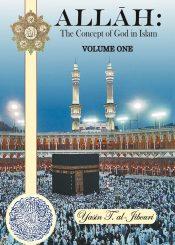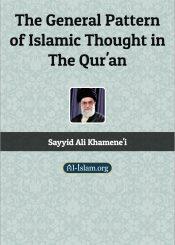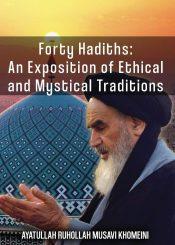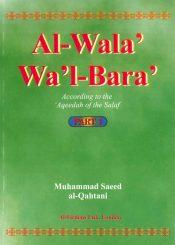The Karamah of Awliya’Allah
The Karamah of Awliya’Allah
0 Vote
371 View
By: Muhammad Husayn Ibrahimi Another point upon which the Wahhabis differ with the Sunnis and the Shi`ah is the issue of miracles {karamat}. All Muslim sects regard the prophets ('a) as people who performed miracles {karamat} and wondrous feats {mu'jizah} because the Qur'an bears witness to the authenticity of this point. Concerning the infallible Imams ('a), however, the only group that does not recognize them to have performed miracles and treat them as equal to others in the possession or otherwise of this merit is the Wahhabis. The Shi`ah characterize the infallible Imams ('a) with having miraculous and marvelous powers, substantiating this fact with religious traditions and historical accounts. Now, if anyone believes that there is a difference between a mu'jizah and a karamah, emphasizing that mu'jizah refers to that which is performed by the prophets as narrated in the Qur'an while karamah refers to that which is performed by the infallible Imams ('a) as narrated in the traditions, it must be said that in any case, the pure Imams ('a) possess powers and forces which the common people undoubtedly do not possess, and it makes no difference whether you call it as mu'jizah or karamah. It is said that some of the real Gnostics and mystics {'urafa'} possess this power and to a lower degree. It is thus stated in the book, Fath al-Majid: The miracles {karamah} of the saints of God {awliya' Allah} are the products of divine attraction and grace, and this affair does not depend upon the person or his knowledge and intention—like the karamah of 'Ali (may Allah be pleased with him) on numerous occasions and the karamah of 'Umar (may Allah be pleased with him) when he came to Iran and talked to Prophet Daniel in the town of Shush. Similarly, at the time when Medina was afflicted with famine, 'Umar participated in the prayer for rain and it came. It must not remain unstated that we do not have reliable historical evidence concerning 'Umar's coming to Iran and the town of Shush in particular. It was rather 'Ali ibn Abi Talib ('a) who had come to Shush and talked with Prophet Daniel ('a). With regard to the famine, it must also be said that what has been recorded in reliable sources is that at the request of 'Umar, 'Abbas the uncle of the Prophet (s) performed this prayer. Then, the said author adds that these miracles have no benefit and if there were any benefit, it only pertains to that time. In short, after the death of those possessing karamah, those miracles have no value and one should not expect them.[1][81] Therefore, the Wahhabis believe in a sort of karamah for the Imams ('a), the Companions and leading figures of the religion, but they consider these miracles valuable only at the time when those possessing them are alive because once a person departs from this world, the mark of his existence, like that of other living creatures and even the non-living ones, ceases to exist. They substantiate this statement of theirs with the verse, إِنَّكَ مَيِّتٌ وَإِنَّهُمْ مَيِّتُونَ . You will indeed die, and they {too} will die indeed,[2][82] in which the death of the Prophet (s) has been treated equal with that of the awliya'. They have also inferred from this verse that seeking help from the souls of the prophets ('a) and the awliya' is a futile and vain practice, and that ziyarat al-qubur {prayer recited on visiting a grave} must be shunned. Of course, the prohibition of ziyarah for women is even more emphasized and the philosophy behind it is clear. The miracles of the saints of God as the effect of satisfaction of the soul and God-wariness {taqwa} According to the verses, وَمَنْ يَتَّقِ اللَّهَ يَجْعَلْ لَهُ مَخْرَجًا . And whoever is wary of Allah, He shall make a way out for him,[3][83] And إِنَّ اللَّهَ لاَ يُضِيعُ أَجْرَ الْمُحْسِنِينَ . Indeed Allah does not waste the reward of the virtuous,[4][84] anyone who is wary of God, does righteous deeds and strives to offer sacrifices and charities for the pleasure of Allah, God will show him the way of deliverance from worldly and otherworldly adversities and give him rewards in both worlds. And whenever the people of the world benefit from his good deeds, meritorious rewards shall be granted to him. So, anyone who is of the opinion that the ornament of karamah befits a particular number of people and that these miracles are valuable and effective as long as their possessors are alive, is thinking and believing incorrectly because the quoted verses do not point to a particular person or group. Meanwhile, the ruling on the truly faithful persons is like the ruling on water. When they are alive, everybody can benefit from their presence and when they die and are buried, people can establish spiritual communion with them, turning to them for help and seeking their intermediation. In the same manner, underground water can be obtained by the spade, wheelbarrow and bucket. In spite of this, the Wahhabis believe that anyone who departs from this world, even if he is the Prophet (s), his existence has no more effect and anyone whose existence has no effect is not worthy of tawassul and ziyarah to him would be of no avail, thus to seek someone who has no benefit and gain for one is a futile and vain action. Charities {khayrat}, alms {sadaqat} and vows {nudhurat} The other case which the Wahhabis regard as sources of polytheism are charities {khayrat}, alms {sadaqat} and vows {nudhurat} given on behalf of the dead. Thus, it is stated in the book, Fath al-Majid: The holy shrines, sacred places and graves of the awliya' which have become sites of ziyarah, charities, vows, etc. are places of Satan and it is unlawful to sojourn in these places such as the Zaynabiyyah, the Ra's al-Husayn in Syria, and Karbala' and Najaf in Iraq. The commentator of this book thus writes: There were such places in the Hijaz before, but thanks to God, they were demolished through the able hand of King 'Abd al-'Aziz al Sa'ud, and it is hoped that God would destroy the rest.[5][85] It must be said that if the Shi`ah fulfill their vows and give alms in sacred places, it is for the pleasure of God and such acts are not tainted with any sort of polytheism. The issue that comes to mind is this: Why do the Wahhabis overlook the corruptions and perversions that plague the youth; the wealth that is plundered from Muslim countries; and the culture and civilization that are being destroyed in Muslim lands? Yet, they persistently find fault with charities, alms and ziyarah to the graves of leading figures of the religion, and consider that all the problems of Muslims emanate from these issues. At the time when Europeans are mummifying their great ones and preserving the putrefied bones of inventors in affection for their scientists, why are the Wahhabis trying to destroy the relics and shrines of religious personalities especially the pure Imams ('a) and consider ziyarah to these great personalities as hindrance to development, where in fact these personalities are the fountainheads of guidance {hidayah} and enlightenment {irshad}? Seeking blessings {tabarruk} from the sacred stones Another case highlighted by the Wahhabis and with which they have found fault is the consideration of some stones as sacred and making tawassul to them because they equate this recourse with a sort of idol-worship. As such, they believe that anyone, who takes recourse to these stones, makes a vow upon them, and takes them as intercessors, is a polytheist {mushrik}: وَيَقُولُونَ هَؤُلاَءِ شُفَعَاؤُنَا عِنْدَ اللَّهِ . And they say, 'These are our intercessors with Allah'.[6][86] And with this belief, they have thus written: It is not permissible for the stones from which people seek tabarruk and make vows upon to remain on the surface of the earth. And it is incumbent upon Muslims to obliterate them whenever they have the opportunity to do so.[7][87] The fact must be acknowledged that there is no Muslim country in which Muslims express reverence to a stone, regarding it as an intercessor, and if out of ignorance and heedlessness, some Muslims revere an old stone or tree, asking it for mercy, this practice must not be ascribed to Muslims in general. Of course, there are two stones and two hills whose Qur'anic sanctity made Muslims honor them. They are the following: 1. The Black Stone {al-hajar al-aswad}: This stone is situated in a corner of the Ka'bah, and the beginning and end of every tawaf {circumambulation of the Ka'bah} is determined by it. 2. The Station of Abraham {maqam ibrahim}: The Qur'an enjoins the Muslims to perform prayer at this site: وَاتَّخِذُوا مِنْ مَقَامِ إِبْرَاهِيمَ مُصَلًّى . Take the venue of prayer from Abraham's Station.[8][88] 3. The hills of Safa and Marwah: Regarding these two hills, the Qur'an says: إِنَّ الصَّفَا وَالْمَرْوَةَ مِنْ شَعَائِرِ اللَّهِ . Indeed Safa and Marwah are among Allah's sacraments.[9][89] Of course, it must be noted that if people honor them, and hold in high esteem the Prophet of Islam (s), the pure Imams ('a), the Qur'an, and the religious personalities, it is because they are among the sacraments of Allah and honoring them indicates the purity of hearts: وَمَنْ يُعَظِّمْ شَعَائِرَ اللَّهِ فَإِنَّهَا مِنْ تَقْوَى الْقُلُوبِ . And whoever venerates the sacraments of Allah—indeed that arises from God-wariness of hearts.[10][90] Seeking Tabarruk from the Prophet (s) and his relics The Muslims—Sunnis and Shi`ah—have consensus of opinion on this issue; that the Prophet (s) and his relics must be honored and revered. In confirming this subject one may refer to many historical accounts and the sayings of leading Sunni personalities. For example, Hadrat Zahra ('a) and other Companions used to invoke blessings from the soil of the grave of the Holy Prophet (s); 'Abd Allah ibn 'Umar who strove to preserve the relics of the Holy Prophet (s) even tried to preserve a tree under which the Prophet (s) once rested; Ahmad ibn Hanbal deems it permissible to invoke blessings from the relics of the Messenger of Allah (s); and Sunni fuqaha believe that: زِيَارَةُ القُبُورِ أفْضَلُ الْمَنْدُوبَاتِ . Visitation of graves is the best of all recommended (mustahabb) acts. It is important to note that for this reason, the Prophet (s) and his successors ('a) and their relics as well as other religious objects must be honored as they are the manifestations of the religion and truthfulness of revelation.[11][91] Notes: [12][81] Fath al-Majid, pp. 93, 137, 169. Source: alhassanain.com






